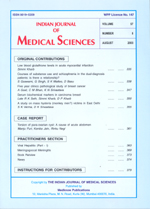
|
Indian Journal of Medical Sciences
Medknow Publications on behalf of Indian Journal of Medical Sciences Trust
ISSN: 0019-5359
EISSN: 0019-5359
Vol. 60, No. 2, 2006, pp. 53-58
|
 Bioline Code: ms06009
Bioline Code: ms06009
Full paper language: English
Document type: Research Article
Document available free of charge
|
|
|
Indian Journal of Medical Sciences, Vol. 60, No. 2, 2006, pp. 53-58
| en |
Choice of antibiotic for empirical therapy of acute cystitis in a setting of high antimicrobial resistance
Biswas Debasis, Gupta Pratima, Prasad Ramjee, Singh Vikram, Arya Muktanjali, Kumar Ashish
Abstract
Background: A high prevalence of antimicrobial resistance among urinary isolates in the Garhwal region of Uttaranchal.
Aims: To identify the most appropriate antibiotic for empirical treatment of community-acquired acute cystitis on the basis of local antimicrobial sensitivity profile.
Settings and Design: A prospective clinico-microbiological study including all clinically diagnosed patients with community acquired acute cystitis attending a tertiary care teaching hospital over a period of three years.
Methods and Material: Clean-catch midstream urine specimens, from 524 non-pregnant women with community-acquired acute cystitis, were subjected to semi-quantitative culture and antibiotic susceptibility by the Kirby- Bauer disc diffusion method. A survey was also conducted on 30 randomly selected local practitioners, to know the prevalent prescribing habits in this condition.
Statistical Analysis: The difference between the susceptibility rates of E.coli isolates to Nitrofurantoin and the other commonly prescribed antibiotics was analysed by applying the z test for proportion.
Results: 354 (67.5%) specimens yielded significant growth of E.coli > 35% of the urinary E.coli isolates were resistant to the fluoroquinolones, which were found to be the most commonly used empirical antibiotics in acute cystitis. Resistance was minimum against Nitrofurantoin (9.3%, 33) and Amikacin (11.0%,39).> 80% of the fluoroquinolone-resistant strains were found to be sensitive to Nitrofurantoin.
Conclusion: The best in vitro susceptibility profile in our study has been shown by Nitrofurantoin and a significantly high proportion of the urinary E.coli isolates have already developed resistance to the currently prescribed empirical antibiotics, viz. the fluoroquinolones. In view of these in vitro susceptibility patterns, a transition in empirical therapy appears imminent.
Keywords
Acute cystitis, Empirical therapy, Antibiotic Resistance
|
| |
© Copyright 2006 Indian Journal of Medical Sciences.
Alternative site location: http://www.indianjmedsci.org/
|
|
